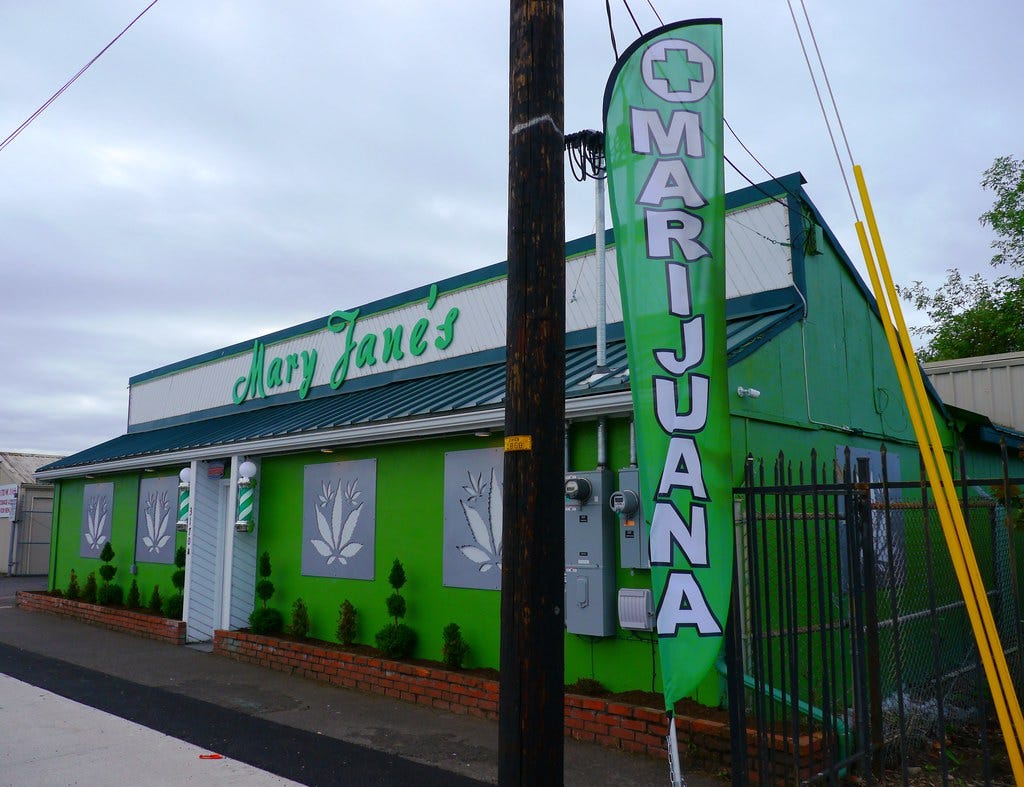Ending Weed-Related Organized Crime Requires Investing in Enforcement
If we don’t act responsibly to prevent illegal cultivation and export of marijuana, the strength of a hypothetical nationwide legal marijuana system won’t matter.
The proliferation of illegal marijuana grows in rural Oregon means that organized crime isn’t just a big city problem anymore. After voters approved marijuana legalization in 2014, the state imposed a regulation system designed to keep the federal government from cracking down on this still-federally prohibited substance. We also kept taxes low to bring the black market into the light. While it’s been a rocky road, we’ve largely been successful in creating a well-regulated market. Widespread illegal marijuana grows by organized criminals in our rural communities put that progress at risk.
The federal government’s legalization of hemp cultivation in 2018, combined with inadequate investment in enforcement, has allowed Oregon to become a magnet for organized criminal activity. (Hemp is a non-intoxicating variety of the same plant as marijuana.) Racketeers operate marijuana farms under hemp licenses, stealing water, and using trafficked labor. Within the last few months, we’ve seen large busts in places as diverse as Linn, Deschutes, and Josephine counties. One was located behind a school, within three miles of I-5. The problem is bad enough in Southern Oregon that Jackson County declared a state of emergency last week. The same day as that declaration, the sheriff’s office there destroyed 17,522 plants and 3,900 pounds of processed marijuana at an illegal grow site.
With a closed market and marijuana prices in Oregon lower than in states where marijuana has not been legalized, most of the Oregon-grown product will go outside the state. Product sold outside of the legal market likely does not adhere to the specifications of that market, so it will likely contain pesticides and other poisons. While the federal government may one day legalize and regulate marijuana in interstate commerce, in the interim it will not ignore large-scale interstate shipments of products contaminated with toxic chemicals. Should we fail to stop this black-market activity, the federal government will inevitably crackdown and put our legal intrastate market at risk.
There’s an even worse possibility – kids and adults buying dangerous products. Increasing evidence suggests that outcome happens more and more regularly. As hemp prices cratered, some farmers harvested their crops for CBD, a non-intoxicating compound, and then chemically processed them to create Delta-8 THC and other intoxicating artificial cannabinoids. These were not, at the time, illegal to sell to minors or adults without their knowledge.
Oregon does not have the same safeguards as other hemp-growing states require. Kentucky, Montana, Rhode Island, and North Dakota all require certified seeds for growing hemp, making it easy to check that a farmer is growing hemp, not marijuana, simply by checking purchase records. Other states require a separate license for processing hemp, limiting the potential for diversion into artificial cannabinoids. New York put a single agency in charge of all marijuana products and cannabinoid processing to crack down on artificial cannabinoids like Delta-8. Finally, when it comes to funding law enforcement, 48 other states have higher police to population ratios than Oregon, and the disparity is even greater in rural counties, leaving Oregonians with few good ways to regulate problematic growing operations.
The Oregon State Legislature made some steps in the right direction by passing HB 3000 last June with large, bipartisan majorities. Through that bill, we criminalized the sale of artificial cannabinoids to children and made new investments in crop inspection. The Governor, in turn, allocated State Police resources to help the Oregon Liquor and Cannabis Commission (OLCC) investigate criminal marijuana grows. The investigation confirmed the existence of a large problem: 54% of hemp grows were found exceed the allowable limits of THC, the primary intoxicating compound in marijuana, and another 12% denied entry to inspectors. Put another way, of the 665 locations visited through mid-September of this year, roughly 2/3 had either a positive test or declined to allow inspection.
Much work remains to be done to protect Oregon consumers and the legal market. The Oregon Department of Agriculture remains inadequately committed to enforcing against illegal growers. We lack a credible implied consent program for hemp grows that would allow regulators to test crops at any time. Our marijuana testing programs need to be expanded to allow for early testing of crops before they reach maturity. The Water Resources Department needs funding to be able to detect illegal water diversions and prosecute those who are stealing water from other farmers. And we need to invest in the law enforcement resources necessary to keep organized crime out of our rural communities. We owe this support to the honest farmers who are growing legally under an OLCC or hemp license.
Many supporters of national legalization claim that these would hurt our ability to compete in a national market, once it forms. However, nothing diminishes the drive for legalization more than illegal exports of marijuana from our state. If we don’t act responsibly to prevent illegal cultivation and export of marijuana, the strength of a hypothetical nationwide legal marijuana system won’t matter because the federal government simply won’t legalize it until we’ve shown we can make it work.
Effective enforcement takes resources. In Measure 110, the voters redirected marijuana tax revenues to drug addiction and rehabilitation services, reducing the resources available for enforcement. The Legislature backfilled some of the funding in the last budget, but we have not found a permanent funding mechanism and the current funding levels are not sustainable. It’s also not fair to expect the legal marijuana industry, already under pressure from illegal competition, to pay for all the costs associated with enforcement against illegal grows. The funding mechanism should reflect that this is a broad problem that affects whole communities.
As the work of the task force created by HB 3000 progresses, we’ll need to consider both the policy and funding fixes necessary to restore safety to our rural communities, protect consumers, and defend the legal in-state marijuana market. Whether any of us individually approve of the consumption of marijuana or not, no one is served by water theft and pollution, kids consuming artificial intoxicants, and organized crime operating with impunity in rural parts of our state. We all benefit from communities free of organized crime.
Marty Wilde represents House District 11.
"Mary Jane's Marijuana Dispensary in Eugene, Oregon" by Only in Oregon is licensed under CC BY 2.0





